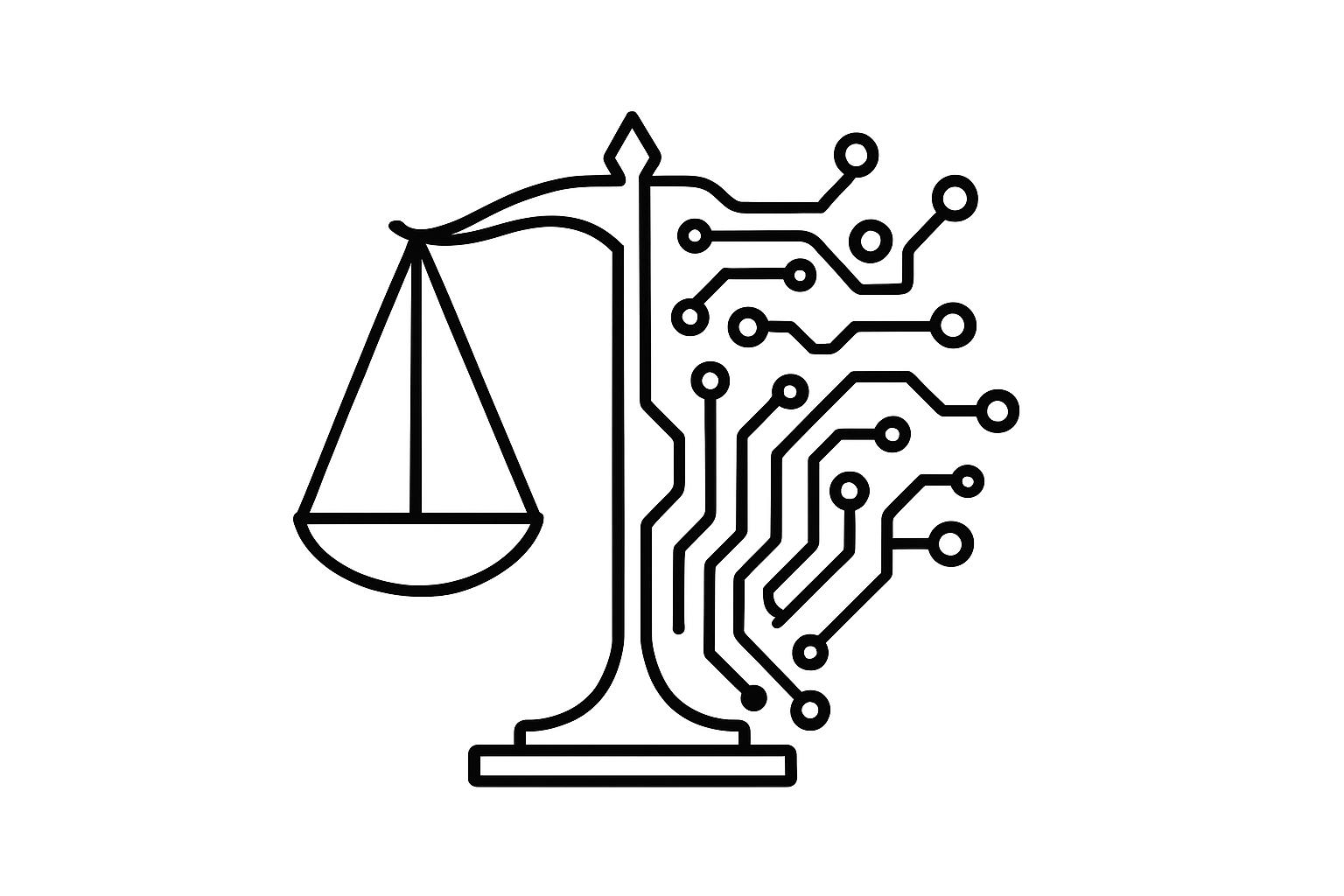
Small businesses face increasing pressure to meet complex compliance requirements, from privacy laws like CCPA to industry-specific regulations. Non-compliance can lead to hefty fines, data breaches, and operational setbacks. To tackle these challenges, AI compliance tools offer automated monitoring, policy updates, and fraud detection, saving time and reducing risks.
Here are six AI compliance solutions tailored for small businesses:
These tools simplify compliance, reduce manual work, and help businesses stay ahead of evolving regulations.
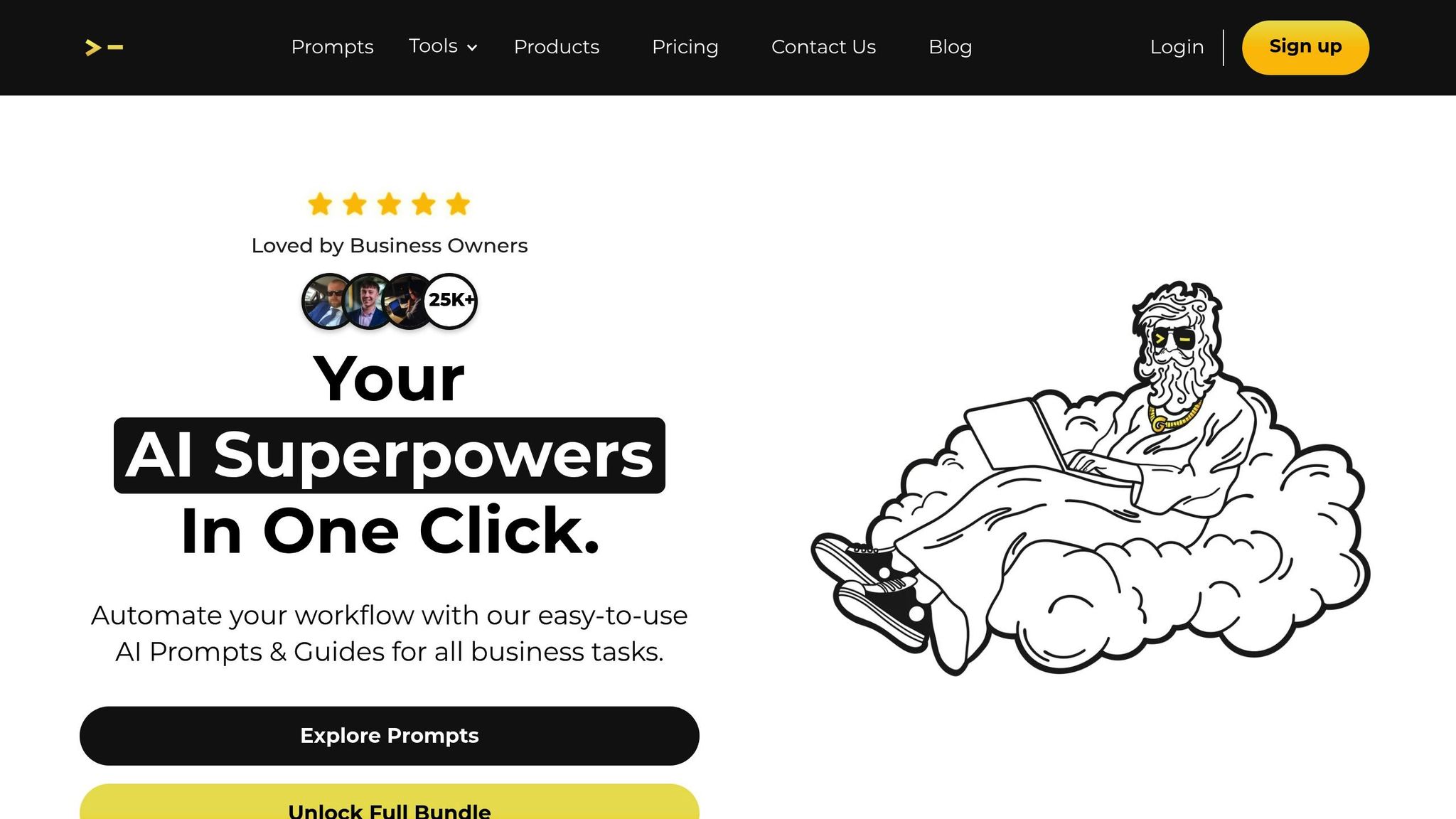
The God of Prompt AI Compliance Prompt Toolkit is a practical, plug-and-play solution designed to help small businesses tackle complex regulations. Unlike other compliance tools that require lengthy setup and training, this toolkit offers pre-built AI prompts that integrate seamlessly with platforms like ChatGPT, Claude, and Gemini AI.
This toolkit covers a wide range of compliance needs, including contracts, corporate law, intellectual property, litigation, and policy analysis. It also includes prompts for ADA compliance, harassment prevention training, and tax analysis, making it simple to update employee handbooks or remote work policies. For healthcare providers, there's a CNA Documentation Compliance Checklist tailored to meet both Pennsylvania and federal standards. These tools make it easier for small businesses to stay on top of ever-changing regulations and maintain compliance.
The toolkit has practical applications across various industries. For instance:
God of Prompt offers flexible pricing options to suit different needs:
All purchases come with a 7-day money-back guarantee, ensuring satisfaction. With a 4.8 out of 5 rating from 743 reviews, this toolkit has earned high praise for its ease of use and effectiveness.
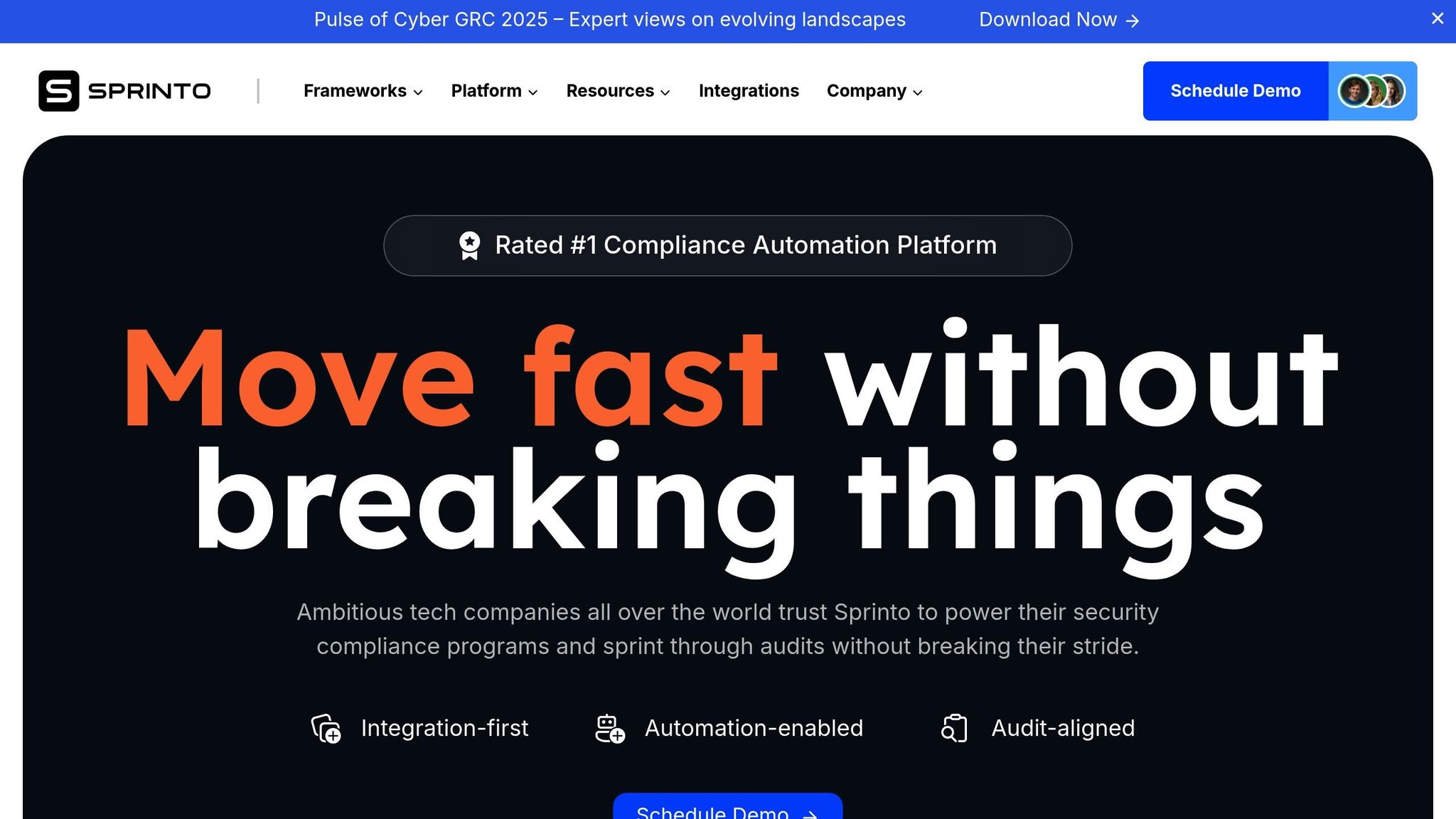
Sprinto is a compliance automation platform designed to help small businesses handle complex compliance frameworks through automation. It simplifies the process by mapping controls to over 20 framework requirements and offering continuous monitoring to maintain compliance.
Sprinto takes the hassle out of compliance by automating evidence collection, streamlining audits and certifications, and providing real-time monitoring to ensure businesses stay aligned with regulatory standards. The platform integrates automated controls into daily operations, embedding compliance seamlessly. Additionally, it offers over 20 customizable security policies and evaluates existing policies against frameworks like SOC 2 to ensure alignment. These features make Sprinto a strong choice for meeting critical compliance standards in the U.S.
Sprinto’s automation tools address key U.S. compliance requirements, including HIPAA, SOC 2, and GDPR. This is especially valuable for healthcare businesses, where compliance challenges are common. For example, 60% of health tech companies struggle to define the scope of HIPAA compliance, and 80% face resource constraints in maintaining compliance. Sprinto helps businesses differentiate between voluntary audits like SOC 2, which demonstrate secure practices, and mandatory standards like HIPAA, which enforce legal requirements for protecting health data.
One notable success story is Dassana, a U.S.-based cybersecurity startup, which achieved SOC 2 compliance in just two weeks using Sprinto’s automated tools. The platform also enabled them to build a scalable, continuous compliance program.
"With Sprinto, life is easy. We don't have to take any action. The platform automates manual tasks, sends us updates, and triggers workflows to remediate compliance drifts."
- Parth Shah, Co-founder and Head of Product and Engineering at Dassana
Small businesses can also use Sprinto to implement HIPAA requirements through a tailored, centralized process, making it easier to manage compliance from one location.
Sprinto offers customized pricing based on business needs and compliance goals, with plans such as Starter, Professional, Advanced, and Enterprise. For small businesses, implementing a single framework typically costs between $4,000 and $5,000 for companies with 1–100 employees. Annual pricing ranges from $6,000 to $25,000, with a median contract value of $14,250, based on market data (low: $8,850; high: $16,825). While some smaller teams might find the pricing steep, Sprinto is often more affordable than traditional compliance tools, as it eliminates the need to build programs from scratch.
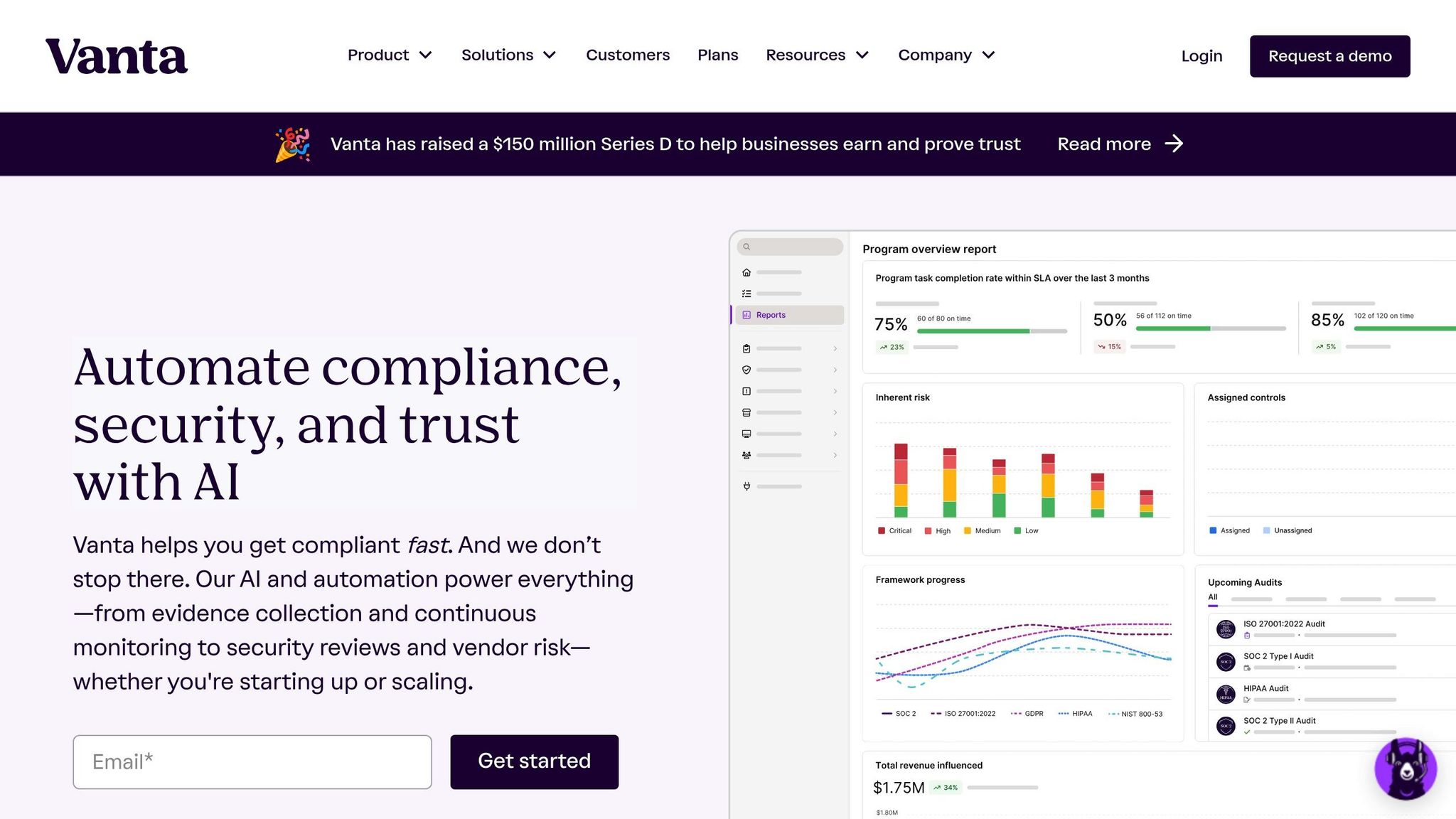
Vanta is a compliance automation platform designed to simplify security and regulatory processes for small businesses. By using intelligent automation and continuous monitoring, Vanta can handle up to 90% of compliance tasks, such as gathering evidence for SOC 2 and ISO 27001 certifications. It integrates with over 300 systems to streamline operations.
Vanta is built to save businesses time and effort. It automates up to 90% of compliance-related tasks, including evidence collection for SOC 2 and ISO 27001, and can cut manual work by as much as 50 hours each month. Continuous monitoring and automated workflows further reduce the burden on teams .
The platform provides tools like policy templates, employee training modules, and risk management features to help businesses establish a solid security framework. It also integrates with major platforms to ensure comprehensive protection across operational systems. These capabilities make Vanta well-suited to meet stringent U.S. regulatory standards.
Vanta’s automation tools are tailored to address critical U.S. regulations, including CCPA and HIPAA. Its US Data Privacy (USDP) framework consolidates controls and requirements from various state-level laws - such as CCPA, CPRA, UCPA, CTDPA, CPA, and VCDPA - offering a unified approach to privacy compliance. This framework is aligned with Fair Information Practice Principles (FIPPs), ensuring businesses stay compliant with both current and evolving privacy standards.
For healthcare organizations, Vanta’s HIPAA tools provide automated monitoring and evidence collection, while its PCI DSS support ensures secure handling of payment data for businesses managing financial transactions .
Vanta’s automation and compliance tools have delivered measurable benefits for a variety of small businesses:
Vanta’s pricing is designed to accommodate businesses of different sizes and compliance needs. For startups and small companies, the annual cost typically falls between $10,000 and $15,000, with a median contract value of $19,750. The platform offers tiered plans, including Core and Plus options for smaller businesses, and Growth, Scale, and Enterprise plans for larger organizations.
Vanta has earned high marks for user satisfaction, with ratings of 4.6/5 on G2 (based on 1,818 reviews), 4.4 on Gartner Peer Insights (from 25 ratings), and 4.3 on Capterra (from 28 reviews). Users frequently highlight its ease of use and time-saving features, though some have mentioned concerns about pricing and onboarding complexity.
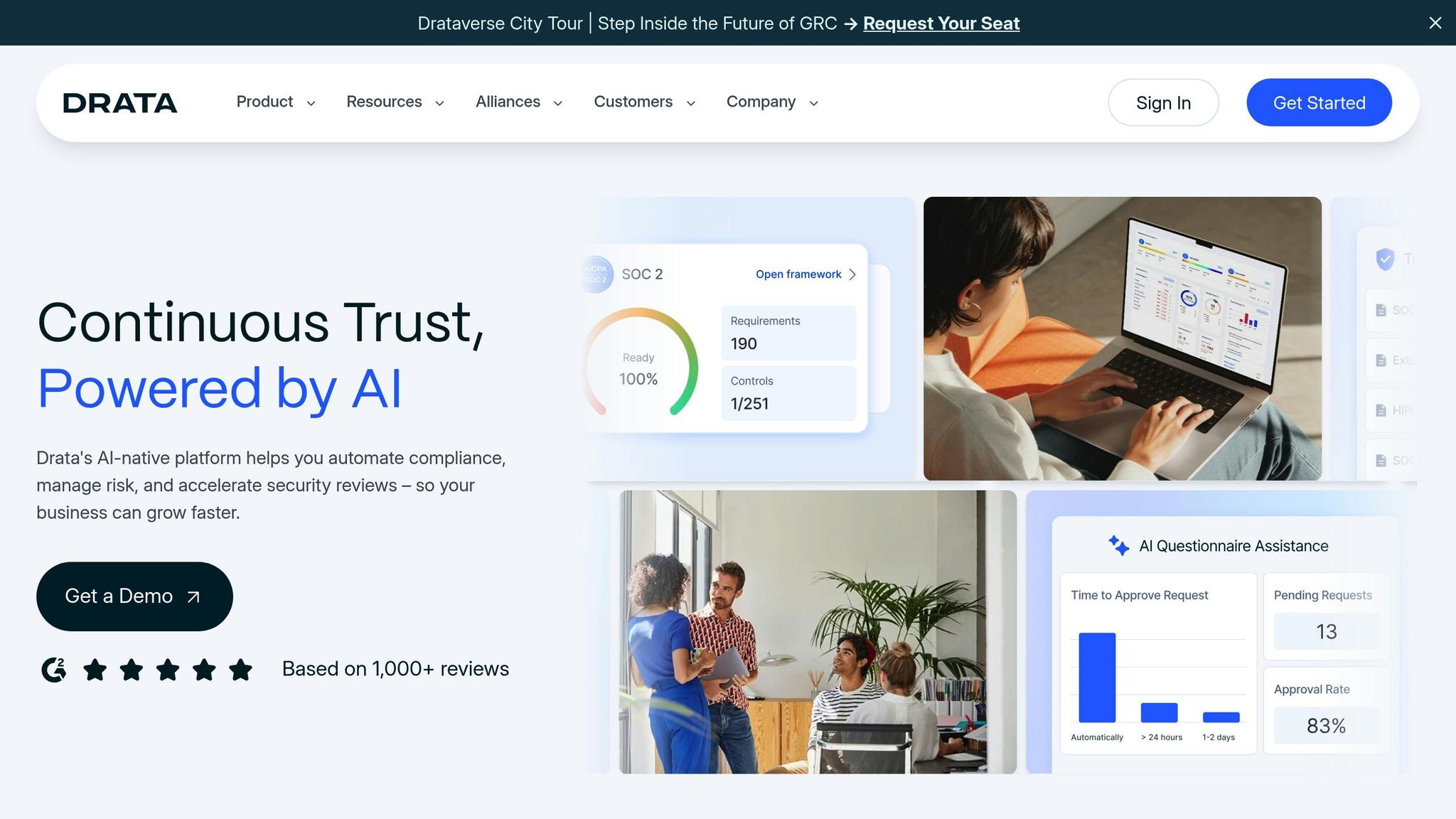
Drata is a cloud-based platform designed to simplify security and compliance processes for businesses. By automating 98% of compliance requests upfront and preparing evidence for auditors, Drata significantly reduces the manual workload, making it an excellent tool for small businesses.
Drata's automation tools make compliance management up to five times faster. The platform continuously monitors security controls and gathers evidence from integrated systems, minimizing manual effort and the risk of human error. It integrates seamlessly with popular tools like AWS, GitHub, and Okta, ensuring data is automatically collected and verified across your entire tech stack.
Small businesses can take advantage of pre-mapped controls, which align regulatory requirements with automated evidence collection. This eliminates the uncertainty of setting up compliance processes. Drata supports multiple frameworks, including SOC 2, ISO 27001, HIPAA, GDPR, and PCI DSS, all from a single dashboard. The platform also provides visual dashboards for real-time compliance tracking and an audit hub where external auditors can efficiently review evidence. For companies with unique requirements, Drata allows the creation of custom frameworks that integrate with existing controls.
"The promise of automation has long been discussed in the compliance world, but never truly realized. Drata has turned that into reality."
– Jonathan Jaffe, CISO
These features make Drata a strong choice for businesses needing to meet strict U.S. regulatory standards.
Drata's automation extends to essential U.S. regulatory frameworks, including HIPAA, NIST CSF, NIST SP 800-53, CMMC, and CCPA. The platform automates 89% of compliance tasks, enabling businesses to achieve compliance four times faster than manual methods. For healthcare organizations, Drata ensures continuous monitoring to meet HIPAA requirements, while its NIST tools help businesses align with federal cybersecurity standards. Additionally, its CCPA features address California's privacy regulations.
Drata's comprehensive approach to compliance has proven effective in real-world scenarios. For example, Calendly implemented Drata and drastically reduced their audit time from 60–70 hours to just three hours.
"I strongly believe that there's no other tool out there that provides such a holistic view of the GRC function like Drata does."
– Rishi Bhatia, Calendly
Drata offers custom-priced plans tailored to the size of the organization and the type of audit required. Pricing details are available through direct consultation.
Vendr data shows that the median customer spends $25,000 annually, with most organizations falling within the $10,250 to $42,750 range. Some sources suggest basic plans can start as low as $1,000 per month. Businesses can choose to pay annually through Drata or opt for flexible monthly, quarterly, or semi-annual billing via AWS Marketplace.
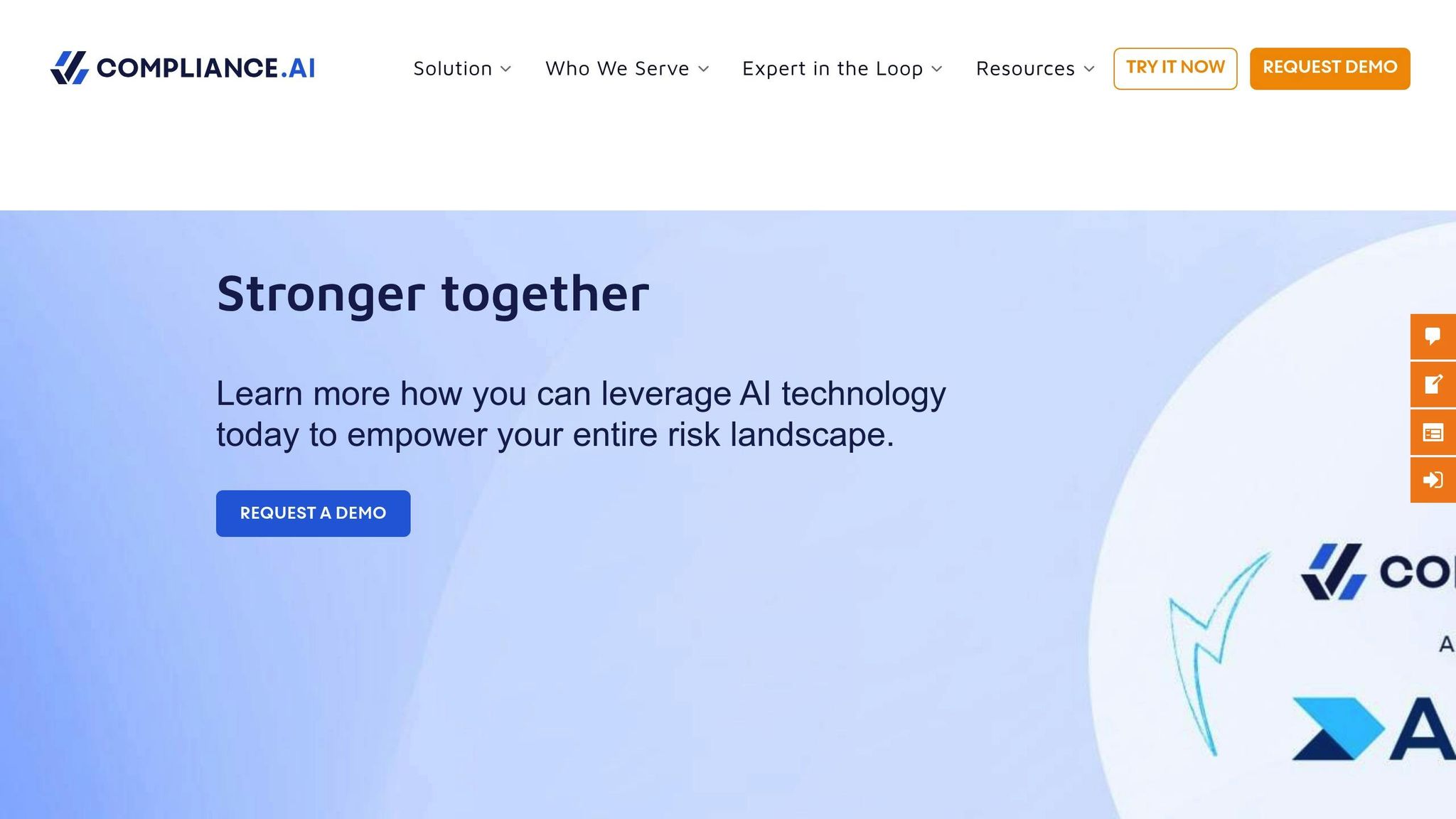
Compliance.ai is a machine-learning platform designed to simplify compliance management for small businesses. By automatically tracking regulatory changes and updating internal policies, it helps businesses navigate the complexities of the nearly 200,000 pages in the U.S. Code of Federal Regulations. This tool ensures companies stay on top of evolving rules and regulations without the constant manual effort.
Compliance.ai uses advanced natural language processing to scan multiple sources and identify regulatory changes that impact policies, controls, and processes. Its regulatory change management center consolidates updates and provides actionable insights, eliminating the need for manual tracking. Automated workflows handle compliance tasks and monitor deadlines, keeping businesses ahead of their obligations.
"Most solutions in the market today are not scalable and still rely on a pull of regulatory content across a multitude of sources, rather than a 'push' of information from a single, reliable source. This is the key value Compliance.ai delivers for banks."
– Richard Dupree, SVP, IHC Group Operational Risk Manager - Bank of the West
The platform also supports audit readiness by offering easy access to audit evidence, minimizing the risk of missed updates and ensuring businesses are prepared for inspections.
Compliance.ai is specifically tailored to meet U.S. regulatory requirements, with a strong focus on financial services. It supports organizations in industries like banking, insurance, fintech, and energy by helping them comply with both federal and state regulations. The platform monitors updates from key regulatory bodies, such as the SEC, which issued over $1.3 billion in penalties last year, providing timely insights to reduce the risk of fines and penalties.
For small businesses, Compliance.ai offers considerable time and cost savings. By automating regulatory monitoring and task management, it can save an average of 174 workdays annually. The platform’s ability to quickly analyze contracts and compliance documents is especially helpful for businesses without dedicated compliance teams. Additionally, its real-time transaction monitoring flags suspicious activities, while predictive analytics identify potential risks, allowing businesses to allocate resources more effectively. Companies using tools like Compliance.ai often see their fraud-related sales losses drop from 4.5% to 2.3%, compared to businesses relying on manual processes.
"Every word makes a difference in regulatory compliance ... so how it applies is very specific to your organization. Having Compliance.ai's software definitely makes my job more efficient."
– Kelly Housh, Consultant - Bremer Bank
Compliance.ai offers flexible pricing tailored to the size and specific needs of each business. Small businesses can choose from various tiers, including the Team Edition, which provides advanced workflow features like automated task delegation based on regulatory updates. Pricing details are available through direct consultation, ensuring businesses can select options that align with their compliance needs and budgets.
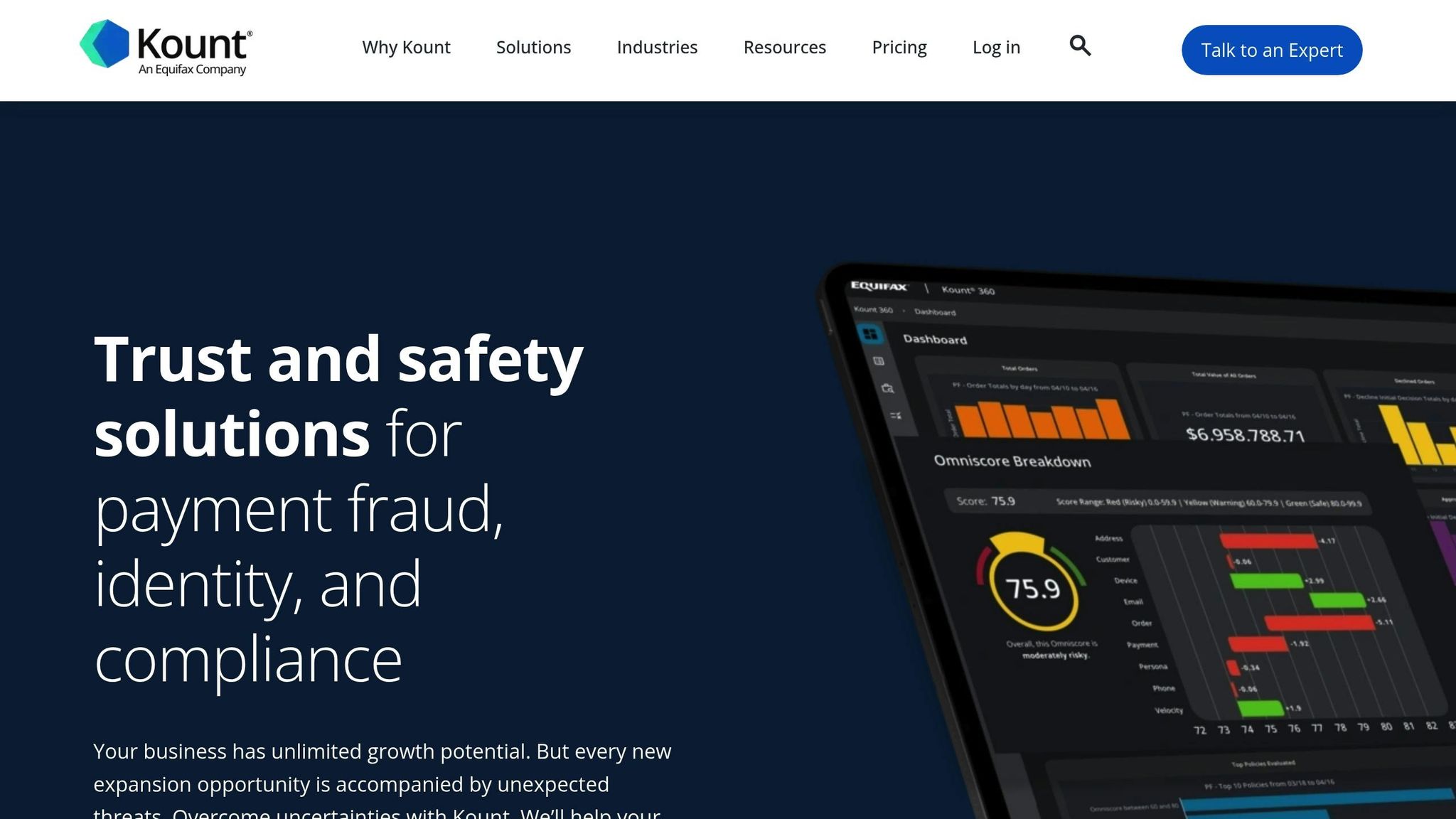
Kount combines fraud detection with regulatory compliance, providing small businesses with a reliable solution for secure payment processing and customer management. The platform focuses on trust and safety by tackling payment fraud, verifying identities, and meeting compliance standards - all in one place. This eliminates the hassle of juggling multiple vendors for various compliance tasks.
Kount's automation revolves around three key areas: global watchlist screening, regulatory reporting, and customer due diligence. It checks customer interactions against global sanctions databases, U.S. government–restricted lists, and politically exposed persons to prevent prohibited activities. Its regulatory reporting tools continuously monitor customer records, updating businesses on risk profile changes without requiring manual intervention. Additionally, Kount's due diligence features include proactive KYC alerts and expert reviews for potential threats.
These capabilities significantly cut down on manual work - reducing manual reviews by about 83%, false positives by 70%, labor costs by 40%, and labor hours by 84%. This efficient system reflects the kind of integrated compliance automation seen in other advanced tools.
"Our unique combination of proprietary data, machine learning, and efficient automation makes it easy to meet regulatory requirements. And because Kount technology is flexible, our solutions will work with your existing business processes, resources, and abilities." - Kount
Kount goes the extra mile to ensure businesses comply with U.S. regulations. The platform taps into data from major U.S. agencies such as OFAC, the U.S. Treasury, Federal Reserve, DOJ, FinCEN, FBI, BIS, and CIA Chiefs of State. This extensive network ensures businesses meet sanctions screening requirements and avoid transactions that could indirectly support criminal or terrorist activities. With real-time screening, businesses can confidently process transactions while staying aligned with federal regulations.
Kount’s features translate into tangible benefits for small businesses across various sectors. For e-commerce, it protects online stores from fraudulent transactions while ensuring compliance with payment regulations. Financial services use its identity verification and reporting tools to manage risks in their merchant portfolios. The platform also supports restaurants handling online orders and mobile payments, as well as health and beauty retailers balancing brand integrity with compliance needs.
A notable example is Winc, an Australian business services provider. Winc faced severe payment fraud issues, including card testing and cross-border fraud, which cost them nearly $4 million in sales. After adopting Kount, unauthorized transactions were nearly eliminated, and chargebacks dropped significantly. This integration also helped Winc maintain compliance with data security regulations like PCI DSS and GDPR.
"We chose Kount over other solution providers because of the flexibility to create and change rules as needed. Plus, it was easy to implement and integrate into our SAP environment." - Head of Asset Protection, Winc
Kount offers tailored pricing based on a business's transaction volume and compliance needs. Pricing details are provided through consultations, allowing businesses to select features that fit their industry and scale. The savings from reduced manual work and fewer false positives often help offset the platform's implementation costs.
Choosing the right AI compliance assistant depends on your business size, regulatory requirements, and budget. Each platform brings unique strengths, from broad regulatory frameworks to specialized fraud protection. Here's a breakdown of six popular solutions:
| Tool | Key Features | Target Business Size | U.S. Regulatory Coverage | Pricing (USD) | Primary Use Cases |
|---|---|---|---|---|---|
| God of Prompt | AI compliance prompt toolkit, 30,000+ prompts, lifetime updates | Small to medium businesses | General compliance guidance across industries | $37–$150 one-time | Content creation, compliance documentation, workflow automation |
| Sprinto | Automated compliance monitoring, risk assessments, audit preparation | Small to enterprise | SOC 2, ISO 27001, GDPR, HIPAA | Custom pricing (consultation required) | SaaS companies, healthcare, financial services |
| Vanta | Continuous monitoring, automated evidence collection, 20+ frameworks | Small to medium businesses | SOC 2, PCI DSS, HIPAA, ISO 27001 | Starting at $3,000/year | Tech startups, e-commerce, healthcare |
| Drata | Real-time compliance tracking, automated controls testing | Small to medium businesses | SOC 2, PCI DSS, HIPAA, ISO 27001, GDPR | Starting at $1,500/month | SaaS platforms, fintech, healthcare |
| Compliance.ai | Regulatory change management, AI-powered updates | Small to enterprise banks | Banking regulations, OFAC, FinCEN, Federal Reserve | Custom pricing (consultation required) | Banks, credit unions, financial institutions |
| Kount | Fraud detection, identity verification, sanctions screening | Small to medium businesses | OFAC, Treasury, FinCEN, PCI DSS | Custom pricing based on transaction volume | E-commerce, payment processing, financial services |
Pricing models vary significantly across these platforms. God of Prompt stands out with a one-time payment option ranging from $37 to $150, making it an attractive choice for small businesses seeking compliance templates and guides. On the other end of the spectrum, Drata starts at $1,500 per month, while Vanta offers annual plans beginning at $3,000.
For businesses with more specific needs or larger operations, Sprinto, Compliance.ai, and Kount offer custom pricing tailored to unique requirements or transaction volumes. This flexibility can be especially useful for companies with complex compliance demands or high transaction activity.
When it comes to regulatory coverage, the tools can be grouped into two main categories:
God of Prompt offers a straightforward solution with minimal setup, providing ready-to-use templates and educational resources. This makes it a great starting point for small businesses new to compliance. In contrast, Vanta and Drata feature user-friendly interfaces that are accessible for non-technical teams, while Sprinto, Compliance.ai, and Kount may require more integration and customization to unlock their full potential.
Small businesses should also think about their future needs. God of Prompt is an excellent choice for those just beginning their compliance journey, offering tools to build a strong foundation. For companies preparing for SOC 2 audits or facing increasing regulatory demands, Vanta and Drata provide scalable solutions with tiered plans. Meanwhile, financial institutions will benefit from Compliance.ai's banking-specific capabilities, and e-commerce businesses will find Kount's fraud detection tools particularly useful.
Each of these platforms helps simplify regulatory challenges, whether you're looking for a cost-effective entry point or a comprehensive solution that can grow with your business. For instance, God of Prompt can expand with additional prompt collections, while Vanta and Drata offer plans that adapt as your business scales. On the other hand, Sprinto, Compliance.ai, and Kount are designed to handle more complex compliance needs and significant growth.
AI-powered tools have made regulatory compliance far more approachable for small businesses. The six platforms discussed showcase how artificial intelligence can shift compliance from being a tedious obligation to a strategic advantage. In 2022, 92.1% of businesses reported measurable results from AI investments, proving that these tools deliver tangible benefits. Beyond easing compliance pressures, they also bring measurable financial gains.
For instance, companies using proactive AI solutions have cut losses from fraud, reducing the rate from 4.5% to 2.3%, while increasing productivity by as much as 40%. A fintech company, for example, integrated AI agents into its compliance workflows, achieving a 60% reduction in turnaround time and significantly improving audit readiness.
Success hinges on selecting the right tool for your business. Whether it’s God of Prompt's user-friendly toolkit, Vanta, Drata, Compliance.ai, or Kount’s specialized features, each platform addresses distinct needs. For a detailed breakdown of features and pricing, refer to the comparison table above.
When evaluating your AI compliance assistant, think both short-term and long-term. Experts recommend prioritizing tools with intuitive designs, comprehensive documentation, and a clear understanding of total cost of ownership to ensure a solid return on investment. The right choice will align your compliance strategy with your current needs while supporting future growth.
As regulations continue to evolve, AI-powered tools will help your business adapt swiftly and effectively. In fact, 76% of small business owners say AI allows them to focus on high-value tasks, making these tools a smart investment for boosting productivity and driving growth.
Whether you’re just beginning to tackle compliance or looking to refine existing processes, the right AI assistant can turn regulatory hurdles into opportunities for operational success.
AI compliance tools are a game-changer for small businesses, taking the hassle out of keeping up with ever-changing regulations. These tools automate the monitoring and interpretation of regulatory updates, making it easier to stay in line with industry standards and legal requirements.
They take care of tasks like compliance testing, documentation, and reporting, which not only saves time but also reduces the chance of human errors. By simplifying these processes, businesses can stay ahead of regulatory changes, avoid costly penalties, and concentrate their energy on growing their operations instead of wrestling with complicated rules.
When selecting an AI compliance tool, small businesses need to prioritize a few critical aspects: regulatory coverage, data security, and automation features. Look for tools that align with key regulations like GDPR or CCPA while offering strong protections for sensitive data.
It's also smart to choose a solution that can adjust to evolving regulations, works smoothly with your current systems, and streamlines compliance processes to save you time. Make sure to assess whether the tool is designed for your industry and business size to ensure it meets your specific operational needs.
Industries like healthcare, finance, manufacturing, legal, and energy stand to gain a lot from AI compliance tools. These sectors face intricate regulations and handle sensitive data, making staying compliant an absolute necessity.
Take healthcare and financial services, for instance. They can leverage features such as real-time compliance monitoring, automated data analysis, and streamlined reporting. These tools not only help businesses minimize legal risks but also ensure they meet regulatory standards while managing massive amounts of data efficiently. This makes AI compliance tools particularly useful for industries where compliance is non-negotiable.






